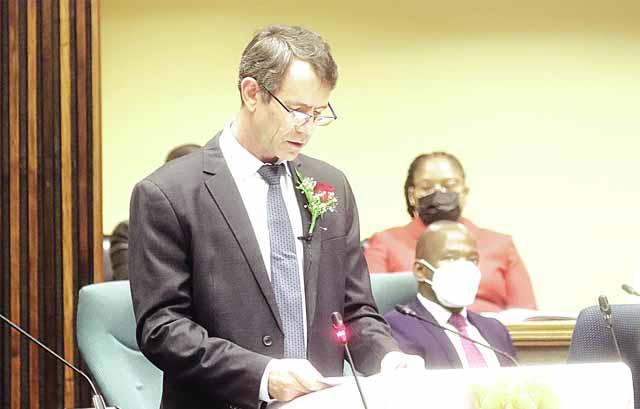Africa-Press – Eswatini. Government has set aside E290 million for civil servants’ cost of living adjustment allowance (CoLA), review appeals and for engaging a salary review specialist/consultant.
This was revealed by Finance Minister Neal Rijkenberg yesterday when tabling his 2022/2023 budget before the House of Assembly.
The minister said even though a huge amount of effort was going into reducing the exorbitant wage bill, government remained aware of the fact that civil servants had been getting no or below-inflation cost of living adjustment recently.
“In spite of the E1 billion reduction in our budget, an effort has been made to accommodate CoLA at E220 million, salary review exercise at E15 million and E55 million for appeals,” the minister said.
The above figures suggest that government intends to offer a three per cent salary review and also deal with the 2016 outstanding salary review appeals.
The CoLA pronouncement was welcomed by Public Service Minister Mabulala Maseko, who had already started negotiations processes with public sector associations, who are demanding a salary review in the new financial year.
They claimed that the last one in 2016 had a five year lifespan which lapsed last year.
Maseko appeared excited at the news from his finance colleague and said despite the challenges the country had been through, the Tinkhundla system of governance noted the difficulties workers went through and decided to make this accommodation, with the review also going to be undertaken in the coming year.
implemented
He hopes come next year they would have resolved all the issues of concern to public servants.
In his budget speech, the finance minister said the Wage Bill had soared at alarming rates for five years before the hiring freeze policy was implemented.
The accelerated increase began in 2013/14 when the wage bill increased by 13.5 per cent from E4 billion to E4.5 billion.
The minister said it increased by a further 7.5 per cent to E4.8 billion in 2014/15, another 10.7 per cent in 2015/16 to reach E5.3 billion and then a further increase by 22.5per cent to E6.5 billion in 2016/17 due to the salary review.
“In 2017/18 the wage bill grew by 6.3 per cent to reach E6.9 billion. Over the five years from 2013 there was a total growth of 61 per cent in the wage bill.
“In 2018/19 there was a slight reduction in this alarming growth trajectory with a relatively muted increase of 2.5 per cent settling at E7.1 billion due to the hiring freeze that was implemented.
Adjustment
“In 2019/2020 a further dampening of this trend continued with only a 0.5 per cent increase in the wage-bill. In 2020/21 automatic notching, COVID-19 hiring and the Cost of Living Adjustment led to a further 6.5 per cent increase to E7.4 billion.
“In 2021/22 the wage bill is projected to decrease to E7.3 billion, a reduction of 2.1 per cent. This is further projected to decrease in 2022/23 by 1.7per cent. All these numbers exclude the pension contributions,” the finance minister stated.
He said the hiring freeze has been successful in muting the growth of the wage bill, increasing by only 3.2 per cent over the five year outlay from its implementation and resulting in an average growth of 0.64 per cent in sharp contrast to the 12 per cent average annual growth recorded in the preceding five-year period.
For More News And Analysis About Eswatini Follow Africa-Press







